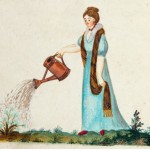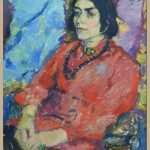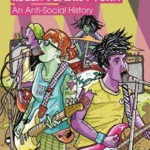 Sonderausstellung im Sigmund Freud Museum (Web)
Sonderausstellung im Sigmund Freud Museum (Web)
Ort: Sigmund Freud Museum, Bergg. 19, 1090 Wien
Laufzeit: 16.10.2015-12.06.2016
Eröffnung: 15.10.2015, 19.00 Uhr
Marie Bonaparte, Helene Deutsch, Emma Eckstein, Anna Freud, Lou Andreas-Salomé und Sabina Spielrein beeinflussten das Werk von Sigmund Freud ebenso wie die Entwicklung der Psychoanalyse maßgeblich.
„Das ist das starke Geschlecht.“ mit dieser ironischen Anspielung soll Emma Eckstein einst Sigmund Freud begrüßt haben. Dieses Zitat vermittelt in aller Kürze die möglichen Neudeutungen herrschender Geschlechterrollen. Als Patientinnen lieferten diese Frauen Sigmund Freud die Grundlage für seine Entdeckung des Unbewussten; wie er mit ihnen gemeinsam seine Behandlungsmethode der ‚Redekur’ entwickelte, wurde auch vom „Vater der Psychoanalyse“ selbst bestätigt. Continue reading
Monthly Archives: August 2015
CfP: Women in Prison (Edited Collection); DL: 15.10.2015
Co-editors: Erica Rhodes Hayden, Ph.D. and Theresa Jach, Ph.D. Seeking submissions for a collection of essays on the topic of women in prison to be proposed to Lexington Books.
Abstracts due: October 15, 2015
Historically, women incarcerated in prison, jails, and reformatories accounted for a small number of inmates across the United States. Early on, they were often held in prisons alongside men and faced neglect, exploitation, and poor living conditions. Various attempts to reform them, ranging from moral instruction and education to domestic training, faced opposition at times from state officials, prison employees, and even male prison reformers. Due to the consistent small populations and relative neglect the women often faced, their experiences in prison have been understudied. Read more and source … (Web)
Vortrag: Renate Flich: Poesie und Wirklichkeit im 19. Jhd. Der Mensch im Spannungsfeld von Öffentlichkeit und privatem Gefühlsleben, 17.09.2015, Wien
 Vortrag im Rahmen der Ausstellung „Denk an mich! Stammbücher und Poesiealben aus zwei Jahrhunderten“ (Web)
Vortrag im Rahmen der Ausstellung „Denk an mich! Stammbücher und Poesiealben aus zwei Jahrhunderten“ (Web)
Ort: Österreichisches Museum für Volkskunde, 1080 Wien
Zeit: Do, 17.09.2015, 18:00 Uhr
In der ersten Hälfte des 19. Jhds. – im Biedermeier – feierte das Poesiealbum eine Hochblüte. Ein spezieller Lebensstil, der sich in gediegener Wohnkultur, in der Kunst und im Gesellschaftsleben äußerte, prägte diese Zeitspanne zwischen dem Wiener Kongress 1815 und dem Ausbruch der Revolution 1848. Woher kommt der Begriff ‚Biedermeier‘ und welche Inhalte verbinden wir heute mit ihm? War das Biedermeier ausschließlich bieder? Lebten damals die Menschen wirklich so idyllisch und unbeschwert gesellig – wie es viele Lieder und Gemälde vermuten lassen?
Die Bemühungen um Harmonie im kleinen Kreis konnten immer weniger über die Disharmonie im Staatsgefüge hinwegtäuschen. Zensur, Einschränkung der persönlichen Freiheit und politische Unmündigkeit ließen gleichzeitig Umsturzpläne reifen, die 1848 schließlich in einer Revolution eskalierten. Das Biedermeier entpuppt sich als eine vielschichtige und widersprüchliche Epoche.
CfP: Global Status of Women and Girls (Event: 03/2016, Newport News, Virginia); DL: 01.11.2015
Christopher Newport University (Web), College of Arts and Humanities; Laura Micheletti Puaca: Program in Women’s and Gender Studies
Venue: Christopher Newport University
Time: March 3-5, 2016
Proposals due: November 1, 2015
This interdisciplinary conference seeks to foster inquiries into the complex and multifocal issues faced by women and girls around the world, both historically and today. We invite scholars from all academic disciplines to submit proposals addressing the political, social, economic, psychological, developmental, educational, literary, artistic, philosophical, religious, ethical and health issues of women and girls. The conference seeks not only to clarify key questions that must be asked in this vital area of public policy but also to unearth the forces that created these current dilemmas. Through the interdisciplinary study of past and present, the conference will engage researchers in policy conversations benefiting the global community. Read more and source … (Web)
CfP: Female Authors and Artists of German Expressionism (Event: 03/2016, Hartford CT), DL: 30.09.2015
 Northeast Modern Language Association Convention (NeMLA)(Panel)
Northeast Modern Language Association Convention (NeMLA)(Panel)
Time: March 17-20, 2016
Venue: Hartford, CT
Proposels due: September 30, 2015
German Expressionism has been dominated by the works of males — in the visual arts and literary texts, as well as in the secondary literature. The movement was largely defined through poetry included in Kurt Pinthus’s seminal collection Menschheitsdämmerung (1920), in which Else Lasker-Schüler was the sole female to appear alongside many key male figures. Despite the excavation of Expressionist works by women in recent decades, scholarly research on these artworks and texts remains lacking. Few female Expressionists in the German context have received sustained attention, except for perhaps Lasker-Schüler. As a result, male works continue to characterize the canon a century after the Expressionist decade of 1910-1920. Read more and source … (Web)
CfP: Resisting Oppression, Fighting Violence and Transforming the Law and Politics: Women’s Action Across the World (Event: 07/2016, Vienna): DL: 30.09.2015
Session at Third ISA Forum of Sociology „Resisting Oppression, Fighting Violence and Transforming the Law and Politics: Women’s Action Across the World“ (Web)
Venue: University of Vienna
Time: 10.-14.07.2016
Proposals due: 30. September 2015
- Session-Organizers: Barbara G. BELLO, University of Milano, Italy and Alexandrine GUYARD-NEDELEC, Université Paris 1 Panthéon-Sorbonne, France
Taking as a starting point the bottom-up instances of participation and resistance by women’s movements around the world, the session of the Working Group “Gender, Law and Society” of the RCSL aims at discussing how the laws and policies can be transformed, nurtured, deconstructed or improved in a way that they are responsive to women at the local level. In line with the main topic of the Congress, this session welcomes papers strengthening the connections between international, European or local law and politics and their gender implications, inquiring into the role of women as social actors and their agency in the struggles in different scenarios (e.g. Arab Springs, postcolonial settings/countries, racially/ethnically segregated areas within metropolis, etc.), be they part of emancipatory movements, of cultural/religious/racial/ethnic/sexual or other minorities or acting as individuals. Read more and Source … (Web)
CfP: How to act together: From collective engagement to protest (Event, 11/2015, Bolgrade); DL: 15.09.2015
 3rd International conference of the Group for Social Engagement Studies, Institute for Philosophy and Social Theory (Web)
3rd International conference of the Group for Social Engagement Studies, Institute for Philosophy and Social Theory (Web)
Time: November 19-21, 2015
Venue: Belgrade
Proposals due: 15 September 2015
The conference will explore the broad issue of action – in its various sociological and philosophical traditions – and the particular question of collective engagement in its contemporary forms of protest assemblies.
The question of action and human agency has been extensively debated in social theories of the 20th century. The pendulum moved many times from perspectives emphasizing social and economic determinants to those embracing human rationality, self-reflexivity and the ability to actively construct social reality. While some of the pioneer studies of action focused predominantly on micro-contexts and behavior of actors in concrete situations, the crucial question that social theory is facing today is how to once again shift the analysis from the level of individual action to the macrostructural one, i.e. the level of the ’behaviour of the social systems’ – a shift which would escape the simple structural determinism of action and offer at least a horizon of the possible synthesis of the two analytical planes. Read more … (Web)
CfP: Gendering Migration Studies – Beyond the Feminization Paradigm (Event: 12/2015, Göttingen); DL: 31.08.2015
Universität Göttingen
Ort: Göttingen
Zeit: 11.-12.12.2015
Einreichungsfrist: Montag, 31. August 2015
Als eine wesentliche Strukturdimension des „neuen Zeitalters der Migration“ (Erstausgabe 1993) haben Castles und Miller die Feminisierung der Migration beschrieben: Frauen würden nicht nur mehr migrieren als früher, sondern in manchen regionalen Migrationssystemen die Mehrheit der Arbeitsmobilen bilden. Feministische Forschungen wiesen darüber hinaus auch auf weltweite polit-ökonomische Restrukturierungen hin, die eine strukturelle Feminisierung von Arbeit und Verantwortung im globalen Maßstab nach sich zögen. Seitdem gehört das Paradigma der Feminisierung der Migration zum Kernbestand der genderbezogenen Migrationsforschung.
So richtig die Aussage für einige der weltweiten Migrationsbewegungen nach wie vor nicht nur in numerischem Sinne, sondern auch im strukturellen Sinne, ist, so verstellt sie doch einen Blick auf die multiplen, ungleichzeitigen und widersprüchlichen Einschreibungen, Anrufungen und Effekte von Gender und Sexualitäten in Migrationsprozessen. So läuft dieses differenztheoretische Paradigma Gefahr, stereotype Geschlechtszuschreibungen … weiterlesen und Quelle (Web)
Interview mit Maria Katharina Wiedlack: Queer-Feminist Punk. An Anti-Social History – online!
 Radio Grille auf Radio ORANGE 94.0 (Web)
Radio Grille auf Radio ORANGE 94.0 (Web)
Interview mit Maria Katharina Wiedlack, der Autorin von „Queer-Feminist Punk“, mit Musik von queer-feministischen Punkbands (Web).
This monography highlights queer-feminist punk productions, protagonists and scenes within punk rock and provides a historic overview from the 1980s until today. The book shows how queer-feminist punk is capable of negotiating and communicating queer-feminist theoretical positions in a non-academic setting, thereby producing alternative forms of political movement and of queer theory.
By combining feminist and decolonial accounts with their specific punk philosophy of anti-social queerness and expressions of negativity and anger, these countercultural forms of politics and theory parallel recent developments in the academic field that have become known as anti-social or anti-relational queer theory. Continue reading
Der Erste Weltkrieg in Selbstzeugnissen – Auszüge aus Beständen der Sammlung Frauennachlässe Nr. 54: Feldpostschreiben von Richard Pöhn an die Mutter und Schwester in Wien, 21. August bis 12. September 1915 von einem unbestimmbaren Ort in Italien
![Feldpostkarte von Richard Pöhn, 20. August 1915 [Zum Vergrößern anklicken] 1915 08 20](https://salon21.univie.ac.at/wp-content/uploads/1915-08-20-150x150.jpg) Richard Pöhn (geb. 1892) war seit Anfang August 1915 an der Front in Italien eingesetzt. In der Korrespondenz mit der Familie in Wien waren das Funktionieren der Feldpost und Wünsche für Paketsendungen wiederkehrende Themen, wobei anklingt, dass die Soldaten auf materielle Unterstützung durch Angehörige oder Liebesgaben angewiesen waren. Richard Pöhn berichtete weiters von seinem Alltag und den Strapazen als Mannschaftssoldat sowie von Freunden in der Kompanie, mit denen seine Schwester „Addy“ offenbar (unbekannterweise) Liebesgaben-Korrespondenzen führte, die er initiiert hat.
Richard Pöhn (geb. 1892) war seit Anfang August 1915 an der Front in Italien eingesetzt. In der Korrespondenz mit der Familie in Wien waren das Funktionieren der Feldpost und Wünsche für Paketsendungen wiederkehrende Themen, wobei anklingt, dass die Soldaten auf materielle Unterstützung durch Angehörige oder Liebesgaben angewiesen waren. Richard Pöhn berichtete weiters von seinem Alltag und den Strapazen als Mannschaftssoldat sowie von Freunden in der Kompanie, mit denen seine Schwester „Addy“ offenbar (unbekannterweise) Liebesgaben-Korrespondenzen führte, die er initiiert hat.
Feldpostkarte an die Mutter Amalie Pöhn, 21. August 1915
21./8. 1915
Liebe Mama!
Wie ich dir schon mitteilte sind wir von diesem Ort von wo ich dir zuerst schrieb weckmaschiert, über einen 800 m hohen Berg dann ging es meist oben fort. Ein Marsch von 40 km in 24 Stunden. Hier liegen wir in einem Tal umgeben von lauter hohe Bergen.
Von weitem hören wir Kanonendonner. Es ist hier sehr schön, wäre aber schöner im Frieden. Nachts gehen meistens Gewitter nieder. Solange wir in Reserfe sind geht es uns immer besser bekommen täglich ½ L Wein, am 18./8. [Geburtstag von Kaiser Franz Joseph I.] bekammen wir auch Käse Sadinen u. eine Schachtel erfrischungs Bombons. Die Kost ist immer die gleiche, früh Kaffee mittag Rindfleisch mit Bohnen Reis oder Gerstel Suppe. Ich bin gesund. Geht mir gut.
Viele herzliche Grüße von Richard Continue reading
